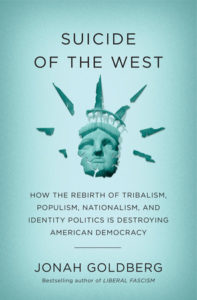
The bloody mess that is Syria stands as Exhibit A of what is happening to global order with the retreat of American leadership, notes the Washington Post’s Jackson Diehl. In multiple miserable corners of the world, where U.S. envoys and aid would normally be helping victims, deterring malevolent actors and seeking political solutions, there is a void, he writes.
The liberal democratic order is threatened from without by the resurgence of autocratic states and illiberal non-state actors. But it is also being undermined from within by a new tribalism of identity politics which puts ‘the miracle’ of liberal-democratic capitalism at risk, says analyst Jonah Goldberg. Almost everything about modernity, progress, and enlightened society emerged in the last 300 years, he argues in Suicide of the West: How the Rebirth of Tribalism, Populism, Nationalism, and Identity Politics Is Destroying American Democracy.
“If the last 200,000 years of humanity were one year, nearly all material progress came in the last 14 hours,” he argues. “In the West, and everywhere that followed our example, incomes rose, lifespans grew, toil lessened, energy and water became ubiquitous commodities. Virtually every objective, empirical measure that capitalism’s critics value improved with the emergence of Western liberal-democratic capitalism.”
But the core problem today is not tribalism. It’s excessive individualism, which has eaten away at our uniting faith and damaged our relationships with one another, notes David Brooks. Goldberg points out that for eons human beings were semi-hairless upright apes clumped in tribes and fighting for food. But about 300 years ago something that he calls “the Miracle” happened, he writes for the New York Times:
For thousands of years, societies divided people into permanent categories of race or caste. But, Goldberg writes, “the Miracle ushered in a philosophy that says each person is to be judged and respected on account of their own merits, not the class or caste of their ancestors.” That belief, 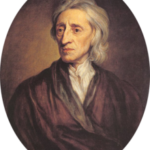 championed by John Locke (right), or a story we tell about Locke, paved the way for human equality, pluralism, democracy, capitalism and the idea that a person can have a plurality of identities and a society can contain a plurality of moral creeds.
championed by John Locke (right), or a story we tell about Locke, paved the way for human equality, pluralism, democracy, capitalism and the idea that a person can have a plurality of identities and a society can contain a plurality of moral creeds.
“Excessive individualism has left us distrustful and alone — naked Lockeans,” Brooks contends. “When people are naked and alone they revert to tribe. Tribalism is the end product of excessive individualism.”
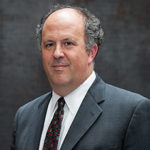
The predominance of democratic governments and the widespread embrace of democratic principles forged a world that became freer and more prosperous than ever before, Freedom House president Michael Abramowitz (left) said in a recent speech to U.S. Naval Academy, in which he listed democracy’s accomplishments:
- Democracy was embraced by the countries of Europe. It led to an unprecedented period of harmony in a part of the world that had experienced the world’s most deadly wars. In short, large-scale war in Europe became a thing of the past.
- The success of free institutions, free markets, and human rights led to the eclipse of the totalitarian ideologies that were responsible for mass murder, gulags and killing fields, censorship and thought control, and the exaltation of the party-state above everything else.
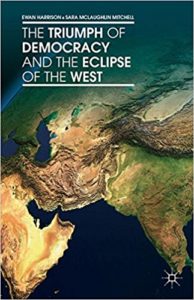 The triumph of democracy led to the normalization of civil-military relations and a clear separation of the military sphere from the political throughout most of the world. Until recently, that meant that the military dictatorship, once common, almost disappeared.
The triumph of democracy led to the normalization of civil-military relations and a clear separation of the military sphere from the political throughout most of the world. Until recently, that meant that the military dictatorship, once common, almost disappeared.
- Democracy transformed the lives of billions of people outside Europe. It helped lead to the emergence of prosperous societies in Asia, the end of South African apartheid, and the end of civil wars and military juntas in Latin America.
- Democracy fostered the growth of independent media, including the global internet, and the spread of the idea that access to information is a right for all people.
- Democracy greatly enhanced political stability, which in turn fostered unprecedented gains in personal health and education.
- Democracy fostered the spread of the values of open inquiry and educational opportunities on a global scale, as reflected in the openness of the great universities of the democratic world to students from across the globe.
Complacency about democracy
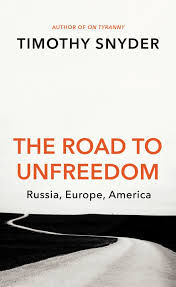 Today’s angry political climate compels us to re-examine the meaning of democracy, argues Mark Mazower, a professor of history at Columbia University. If there is one good thing to come out of the current political uncertainty, it is that complacency about democracy will be harder to sustain in future, Let us not worry overly about how to define a fascist: there are plenty of other nasty kinds of authoritarian regimes. It is the crisis of democracy that should concern us more, he writes for the Financial Times:
Today’s angry political climate compels us to re-examine the meaning of democracy, argues Mark Mazower, a professor of history at Columbia University. If there is one good thing to come out of the current political uncertainty, it is that complacency about democracy will be harder to sustain in future, Let us not worry overly about how to define a fascist: there are plenty of other nasty kinds of authoritarian regimes. It is the crisis of democracy that should concern us more, he writes for the Financial Times:
We know by now what can happen when the institutions of representative government become bitterly polarised, when large swathes of the electorate lose the capacity to compromise, when power and wealth pile up in the hands of elites and when those in charge of the state give up the challenge of responding to widespread economic hardship. History is not a one-way street and democracy has turned authoritarian before.
Two current analyses – Madeleine Albright’s Fascism: A Warning and Timothy Snyder’s The Road to Unfreedom – fail to make the case that Western democracy is threatened by fascism or that Russia’s Putin is ideologically motivated, writes the Washington Post’s Christian Caryl.







